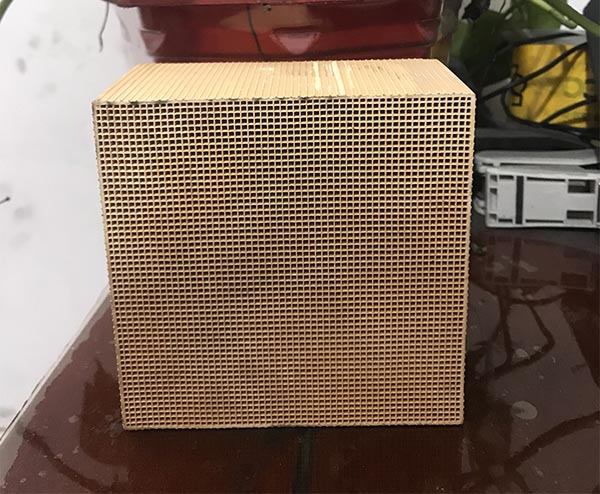
Honeycomb zeolite molecular sieve Its main material is natural zeolite, which is an inorganic microporous material composed of SiO2, Al2O3 and alkaline metals or alkaline earth metals. Its inner pore volume accounts for 40-50% of the total volume, and its specific surface area is 300-1000 m2/g. It has the characteristics of high temperature resistance, non flammability, good thermal stability and hydrothermal stability. It is an efficient molecular sieve carrier with good adsorption performance, no secondary pollution, and can be regenerated at high temperature, Compared with peers Activated carbon The efficiency is increased by 40%, which is widely used in the fields of adsorption, separation, catalysis and environment, and is more suitable for the treatment of organic waste gas with large air volume and low concentration. The adsorption material has a stable ozone decomposition ability, which significantly improves the decomposition efficiency of VOCs. The adsorption material first forms a special structural effect through the combination design of silver and manganese, which can decompose ozone into active oxygen atoms, and then react with VOCs molecules to form carbon dioxide and water.
Honeycomb Zeolite molecular sieve Its main material is natural zeolite, which is an inorganic microporous material composed of SiO2, Al2O3 and alkaline metals or alkaline earth metals. Its inner pore volume accounts for 40-50% of the total volume, and its specific surface area is 300-1000 m2/g. It has the characteristics of high temperature resistance, non flammability, good thermal stability and hydrothermal stability. It is an efficient molecular sieve carrier with good adsorption performance, no secondary pollution, and can be regenerated at high temperature, The efficiency of activated carbon is 40% higher than that of similar activated carbon. It is widely used in adsorption, separation, catalysis and environmental fields, and is more suitable for the treatment of organic waste gas with large air volume and low concentration. The adsorption material has a stable ozone decomposition ability, which significantly improves the decomposition efficiency of VOCs. The adsorption material first forms a special structural effect through the combination design of silver and manganese, which can decompose ozone into active oxygen atoms, and then react with VOCs molecules to form carbon dioxide and water.
Mordenite molecular sieve
This kind of zeolite has a layered structure instead of a cage. The structure contains a large number of five membered rings, which are connected together in pairs. Each pair of five membered rings is connected with another pair through an oxygen bridge. A four element ring is formed at the joint. These structural units are further connected to form a layered structure. There are eight membered rings and twelve membered rings in the layer, the latter is elliptical, with an average diameter of 0.74nm, and is the main channel of mordenite. This kind of channel is one-dimensional, that is, straight channel.
High silica zeolite ZSM (Zeolite Socony Mobil) molecular sieve
This kind of zeolite has a series, ZSM-5 is widely used, and ZSM-8 and ZSM-11 have the same structure; The other group is ZSM-21, ZSM-35 and ZSM-38. ZSM-5 is often called high silica zeolite, with the Si/Al ratio up to 50 and ZSM-8 up to 100. This group of molecular sieves also shows hydrophobic characteristics. Their structural units are similar to those of mordenite, consisting of pairs of five membered rings, with no cage like cavities and only channels. ZSM-5 has two sets of cross channels, one is straight through, the other is zigzag perpendicular to each other, both formed by ten yuan rings. The channel is oval and its window diameter is (0.55-0.60) nm. Zeolites belonging to the high silicon group also have silicalite-1 of all silicon type, whose structure is the same as ZSM-5, and silicalite-2 is the same as ZSM-11


